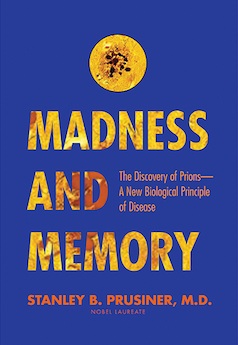Shortlisted for the 2015 Phi Beta Kappa Award in Science
By Anna Moyer
You don’t have to be a biologist to know what causes infection: bacteria, fungi, viruses, and parasites. These four invaders contain proteins and nucleic acids, like DNA or RNA, and enter the body to wreak havoc on native cells. But what if an agent of infection were already inside of you, encoded in your own DNA? In Madness and Memory, Nobel Prize winner Stanley Prusiner presents the terrifying tale of the discovery of prions, which are infectious proteins that contain no genetic material. Prusiner devoted his scientific career to proving that these proteins-gone-rogue cause a class of untreatable and invariably fatal diseases, and this popular science account details the experiments leading to the discovery of prions and Prusiner’s struggle to convince his scientific colleagues of their existence.
The proteins inside of your nervous system form extraordinary molecular machines and astonishingly complex structures, which mediate processes as diverse as creating vision from light and forming new memories within intricate synapses. Most of the time, proteins carry out their functions until they are damaged or no longer needed by the cell, when they are broken down and formed into new proteins. One such protein is called PrPC (Prion Protein), and although little is known about its function, it is found in neurons and probably plays a role in memory formation. Alarmingly, the normally benign PrPC can sometimes spontaneously refold into a new structure, which is dubbed PrPSc. When misfolded PrPSc comes into contact with properly folded PrPC, the PrPC is converted into the toxic form. PrPSc is difficult for the cell to break down, and forms massive globs of proteins that eventually eat holes in the brain, leading to mad cow disease, scrapie, and a variety of other neurodegenerative diseases.
Maybe you have heard of prions, and associate kuru with human cannibalism, variant Creutzfeldt-Jakob disease with tainted beef products, and unlucky genetics with fatal familial insomnia. However, recent research suggests that a wide range of neurodegenerative diseases may be caused by prion-like mechanisms, including Alzheimer’s, Parkinson’s, and ALS. Prusiner’s real life horror story suggests that avoiding environmental triggers is likely not enough to prevent our own proteins from turning on us; in fact, nearly half of Americans over the age of 85 have Alzheimer’s disease. Head trauma may potentiate the progression of protein misfolding and disease progression, and the incidence of certain types of dementia seems to be elevated in veterans and professional football players. Despite the high prevalence of neurodegenerative disorders, no cures are available, and Prusiner offers a compelling argument for increasing funding to scientists hoping develop effective therapies.
Madness and Memory focuses on Prusiner’s struggle to convince other scientists that prions do not contain any DNA or RNA, as the idea that an infectious agent could be made entirely of protein countered years of scientific dogma. The tale excels at explaining complex experiments in common language, and the asides describing trips to Papua New Guinea and PTSD in soldiers are particularly fascinating. However, the interludes that focus on experimental protocols can be distracting, and may be most relevant to especially curious readers. Prusiner’s perseverance and discoveries certainly merit his many awards and honors, but his focus on gaining fame for his work could be off putting to those unfamiliar with competition within scientific research. For instance, he describes breaking ties with friends who were not optimal collaborators or with colleagues whom he perceived as attempting to take credit for his research. Serving almost as a memoir, Prusiner’s descriptions of events are obviously colored by his own opinions, and readers who desire a more balanced narrative may wish to consult other sources in conjunction with Prusiner’s own account.
On the whole, Prusiner’s Madness and Memory gives a terrifying look into how misfolded proteins can provoke a variety of devastating diseases of the nervous system. His determination to prove his hypothesis should serve as inspiration to any lone scientist with an unpopular interpretation of sound data, and his interactions with other researchers highlight the importance of collegiality in the increasingly collaborative world of science. Prusiner’s ability to link abstract research with the development of common, devastating human diseases convincingly demonstrates why we should all be keen to learn more about these infectious proteins.
Anna Moyer (ΦBK, University of Alabama, 2014) is a Ph.D. student at the Johns Hopkins School of Medicine where she is studying human genetics.




